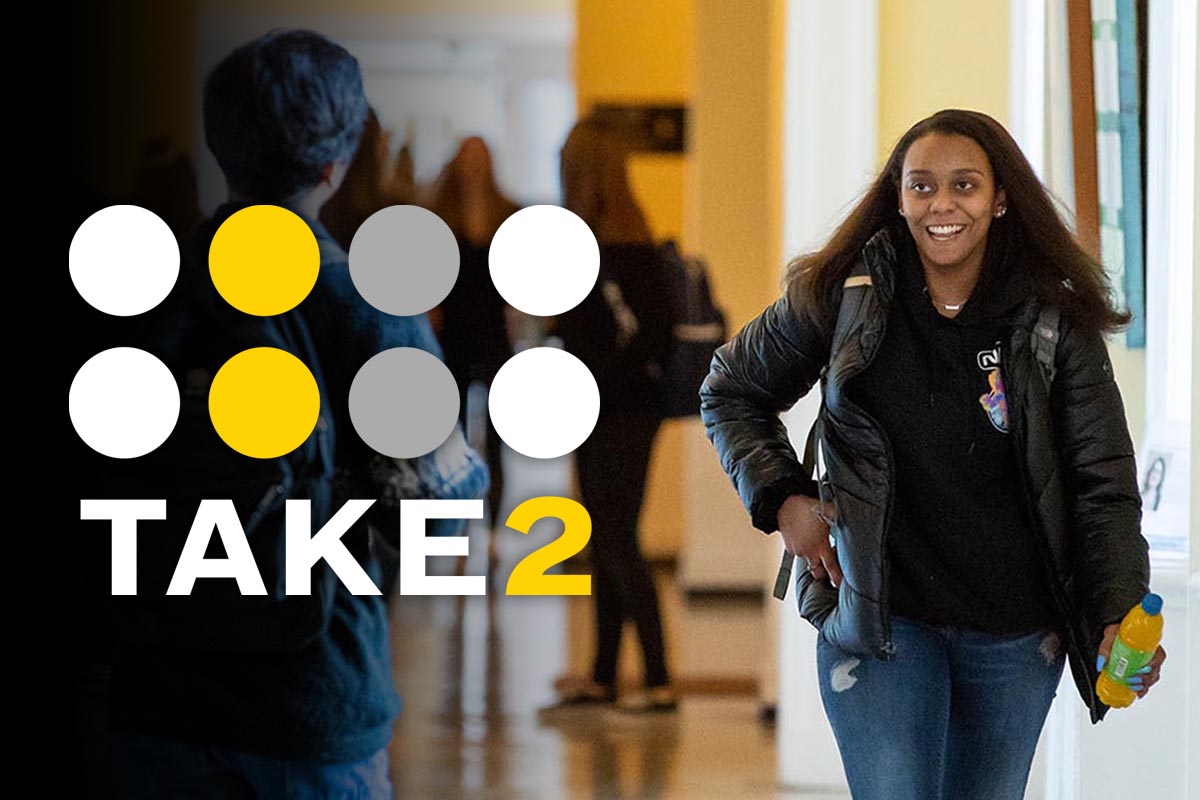New Borker Film Series pays homage to female leaders and activists
 Throughout the 2019-20 academic year, Randolph College will show a special series of films that highlight female activists whose unique identities have empowered them to take bold action to change the world. All films will be shown in Nichols Theatre, located inside the Student Center in Main Hall, at 7 p.m. (with the exception of No! on Feb. 12, 2020) and are free and open to the public.
Throughout the 2019-20 academic year, Randolph College will show a special series of films that highlight female activists whose unique identities have empowered them to take bold action to change the world. All films will be shown in Nichols Theatre, located inside the Student Center in Main Hall, at 7 p.m. (with the exception of No! on Feb. 12, 2020) and are free and open to the public.
The series begins this Wednesday, Sept. 18, with RBG, which showcases the professional and personal life of Ruth Bader Ginsburg. Other films in the series this fall include Custody (Oct. 23), The Cherokee Word for Water (Nov. 13) and Dolores (Dec. 3). In the spring, the series continues with The Education of Shelby Knox, No!, Iron-Jawed Angels, and 13th.
The Borker Film Series is funded by the Ruth Borker Fund for Women’s Studies and was organized by Jennifer Gauthier, a communication studies professor and Danielle Currier, a sociology professor.
“Danielle and I chose the films based on the theme of ‘Intersectionality and Activism’—we wanted to show a wide range of people of various identities who have worked to make positive change in society,” Gauthier said. “We want to celebrate individuals who take bold action to stand up for their rights and the rights of others who may be marginalized. We want to show students that taking action to fight society’s injustices is possible, necessary, and moreover, the responsibility of us all. The individuals that the films showcase—both fictional characters and actual people—are role models for us all.”
“We chose to feature Ruth Bader Ginsburg and RBG because she is a current figure and the film combines politics and activism,” Currier added. “Highlighting women who have changed the world is important and is the goal of the Borker Fund.”
The Ruth Borker Fund for Women’s Studies is named in memory of an anthropology professor and coordinator of women’s studies at R-MWC. She also conducted extensive research on gender studies including women and language and a comparative study of gender concepts in different parts of Europe. The Ruth Borker Initiative Fund for Women’s Studies was established after her death in 1989 to support faculty and departments across the College curriculum to integrate gender-related perspectives and to establish other programmatic initiatives to advance an understanding of women’s studies. The initial grant was given by a College trustee, Sally Schindel Cone ’54, who was inspired by Borker’s vision for women’s studies.
Read more about the films in the Borker Film Series below:
RBG (Sept. 18)
In this documentary, the professional and personal life of Ruth Bader Ginsburg, nicknamed “Notorious RBG” by her biographers and followers, is presented. On the professional side, most of the focus on her career is as a lawyer and ultimately in 1993, only the second woman ever appointed as a Justice of the U.S. Supreme Court, a position she still holds today at age 85. Much of that work centers on eliminating gender discrimination—both of females and males—under the law, many policies, especially implemented by privileged white men, inherently discriminating based on what are seen as stereotypical gender roles in society.
Although seen as a liberal leaning justice, she is seen even more as a consensus builder among her Supreme Court colleagues. It is in that role that she has formed an unlikely friendship with conservative leaning justice Antonin Scalia. That role of consensus builder changed when the balance in the court shifted radically to the right, and she instead felt compelled to voice her dissenting view to her colleagues in that continuation of the want for equality for all. Her legal ferocity belies the fact of her diminutive physical stature and generally soft-spoken nature.
On the personal side, she was married for 50 years to fellow lawyer and law school colleague Martin D. Ginsburg until his death in 2010. During his life, he deferred to her more successful law career despite his own success as a tax lawyer. Their household defied those stereotypical gender roles in certain respects at a time in society where it would have been considered unique. Her love of opera is also shown, having appeared in one opera herself in a non-singing role.
(2018, documentary) – Directors: Betsy West, Julie Cohen
Custody (Oct. 23)
Custody is a quiet, brutally relentless psychological thriller about family violence. Miriam and Antoine Besson have divorced, and Miriam is seeking sole custody of their son Julien to protect him from a father she claims is violent. Antoine pleads his case as a scorned dad whose children have been turned against him by their vindictive mother. Unsure who is telling the truth, the appointed judge rules in favor of joint custody. A hostage to the escalating conflict between his parents, Julien is pushed to the edge to prevent the worst from happening. Most of the terror in the film is filtered through the eyes of the child, Julien—the 10-year-old boy at the center of his parents’ vicious legal struggle.
(2018, drama) – Writer/director Xavier Legrand
The Cherokee Word for Water (Nov. 13)
The Cherokee Word for Water is based on the true story of the Bell Waterline Project. The feature film is set in the early 1980s in a rural Oklahoma Cherokee community where many houses lacked running water. Led by Wilma Mankiller (played by Kimberly Guerrero, A&E’s Longmire) and Cherokee organizer Charlie Soap (played by Mo Brings Plenty, Netflix’s House of Cards), the community of volunteers built nearly 20 miles of waterline to save their community. The successful completion of the waterline, using the traditional concept of gadugi—working together to solve a problem–led to Wilma’s election as chief, Wilma and Charlie’s marriage, and sparked a movement of similar self-help projects across the Cherokee Nation and in Indian Country that continues to this day.
(2014, drama) – Directors: Charlie Soap, Tim Kelly
Dolores (Dec. 3)
Dolores centers on Dolores Huerta’s commitment to organize California farmworkers as the co-founder of the United Farm Workers (UFW), in alliance with the Chicano Movement, the Civil Rights Movement, Gay liberation and U.S.-based LGBTQ social movements, and the late 20th century women’s rights movement. Including recent and historical interviews with Huerta and her family members, this documentary includes historic film footage from the farmworker strikes and marches in Delano, California, and New York City, the activism of the Delano grape strike that spread throughout the country, Sen. Robert Kennedy’s meetings with the organizers during his presidential campaign, as well as interviews with UFW co-founder Cesar Chavez, theatre artist Luis Valdez, Angela Davis, Gloria Steinem, Hillary Clinton, and Barack Obama.
(2017, documentary) – Director: Peter Bratt
The Education of Shelby Knox (Jan. 22)
This documentary film tells the coming-of-age story of public speaker and feminist Shelby Knox, a teenager who joins a campaign for comprehensive sex education in the high schools of Lubbock, Texas. Lubbock has some of the highest teen pregnancy and STD rates in the nation, the “solution” to which is a strict abstinence-only sex education curriculum in the public schools and a conservative preacher who urges kids to pledge abstinence until marriage.
Shelby Knox is a deeply religious Southern Baptist teenager who joins the Lubbock Youth Commission, a group of high school students representing a youth voice in city government. When the teens confront Lubbock’s sexual health crisis and campaign for comprehensive sex education, Knox throws herself into the battle with missionary fervor, struggling to reconcile her newfound political beliefs with her conservative religious views. When the campaign broadens to include a fight for a gay-straight alliance, Knox must confront her family and pastor in this coming-of-age story.
(2005, documentary) Directors/Producers: Marion Lipschutz and Rose Rosenblatt.
No! (Feb. 12)
The making of this film was a 12-year, grassroots, Black feminist, lesbian, survivor-led international process and journey. Its 2006 world premiere at the Pan African Film Festival in Los Angeles took place one-year before Title IX was applied to college campus sexual assault cases and 11 years before the #MeToo and #TimesUp movements. Focusing on a historically marginalized population, NO! serves as a catalyst to create the space where coalitions and partnerships are formed with Black women and men and other people of color who are working within their own racial/cultural community’s margins of the larger mainstream gender-based violence movements.
(2006, documentary) Writer, director: Aishah Shahidah Simmons
Iron-Jawed Angels (March 22 at 2 p.m.)
This film focuses on the American women’s suffrage movement during the 1910s and follows women’s suffrage leaders Alice Paul and Lucy Burns as they use peaceful and effective nonviolent strategies, tactics, and dialogues to revolutionize the American feminist movement to grant women the right to vote.
(2004, drama) – Director: Katja von Garnier
13th (April 8)
This film explores the “intersection of race, justice, and mass incarceration in the United States.” It is titled after the 13th Amendment to the United States Constitution, adopted in 1865, which abolished slavery throughout the United States and ended involuntary servitude except as a punishment for conviction of a crime. Director Ava DuVernay contends that slavery has been perpetuated since the end of the American Civil War through criminalizing behavior and enabling police to arrest poor freedmen and forcing them to work for the state under convict leasing; suppression of African Americans by disenfranchisement, lynchings, and Jim Crow; politicians declaring a war on drugs that weighs more heavily on minority communities and, by the late 20th century, mass incarceration of people of color in the United States. She examines the prison-industrial complex and the emerging detention-industrial complex, discussing how much money is being made by corporations from such incarcerations.
(2016, documentary) – Director: Ava DuVernay
Tags: Borker Film Series, communication studies, Danielle Currier, documentary, Faculty Scholarship, film screening, films, Jennifer Gauthier, Ruth Borker Fund for Women’s Studies, sociology
